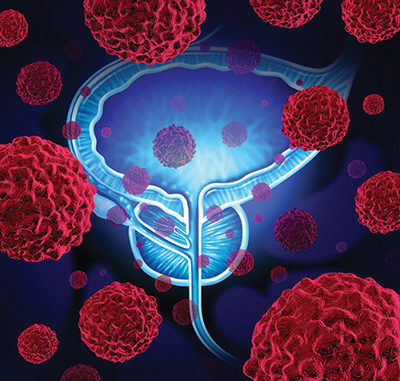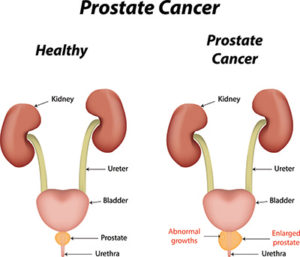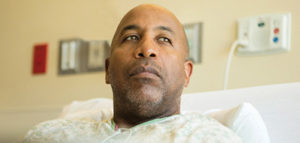
By Marsha Mullings, MPH
 Cancer is a term that describes a collection of related diseases. Cancer occurs when some of the body’s cells divide continuously and begin to invade surrounding cells. Cancerous cells can start anywhere in the body and spread to localized regions and then to distant parts away from the site of origin. When cancer cells begin in the region of the prostate – a gland in the male reproductive system that produces and contains seminal fluid – it is called prostate cancer.
Cancer is a term that describes a collection of related diseases. Cancer occurs when some of the body’s cells divide continuously and begin to invade surrounding cells. Cancerous cells can start anywhere in the body and spread to localized regions and then to distant parts away from the site of origin. When cancer cells begin in the region of the prostate – a gland in the male reproductive system that produces and contains seminal fluid – it is called prostate cancer.
Prostate cancer can affect all men, over a wide age range, generally age 35 and older. Aside from non-melanoma skin cancer, prostate cancer is the most common cancer among men in the United States. It represents about 11% of all new cancer cases and 6% of all cancer deaths.  Approximately 12% of men will be diagnosed with prostate cancer during their lifetime.
Approximately 12% of men will be diagnosed with prostate cancer during their lifetime.
Symptoms
*The symptoms of prostate cancer may vary among men; some may have no symptoms at all. Those with symptoms may experience:
- Difficulty starting urination.
- Weak or interrupted flow of urine.
- Frequent urination.
- Difficulty emptying the bladder completely.
- Pain or burning during urination.
- Blood in the urine or semen.
- Persistent pain in the back, hips, or pelvis.
- Painful ejaculation.
Risk Factors
*All men are at risk of developing prostate cancer. Common risk factors include:
- Older age. Prostate cancer is most frequently diagnosed among men aged 65-74. The median age of diagnosis is 66.
- African American race. Research suggests that there is a higher burden of prostate cancer among Black men of West African ancestry in the US, the Caribbean Islands, the United Kingdom and West Africa.
- Genetic factors. These factors include having a first degree relative such as a father or brother who has had prostate cancer and having family members who have had breast, ovarian, or pancreatic cancer.
Disparities in Prostate Cancer Burden and Mortality
*Cancer is a long-standing public health challenge that can affect anyone. It is well-known however, that cancer burden and mortality affect certain groups more than others. For prostate cancer, disparities in disease burden and death are well-described:
- African American men die of prostate cancer at twice the rate of white men.
- Survival rates for prostate cancer are excellent when the cancer remains local or regional yet for African American men, the death rate is higher than for whites, even if the cancer site is localized or regional.
- Compared to white men, African American men are diagnosed with more aggressive cancer, at younger ages.
- African American men are more likely than white men to underestimate the seriousness of their diagnosis, when presented with a high-risk disease diagnosis.
- Research has shown that African American patients, compared with white patients, are offered less informational consultations and fewer treatment options for their prostate cancer diagnosis.
Some of the disparities can be attributed to broad cultural norms in parts of the African American community, namely issues around distrust of medical establishments due to historical events, and a tendency to present later for management of a suspected illness. Other aspects of the disparities may rest on the medical establishment themselves and on the implicit behavior of medical personnel regarding cancer disease management. Ultimately, reducing racial disparities in prostate cancer burden, and improving survivability overall will require greater educational outreach to African American men, greater advocacy for best practices in disease management and stronger relationships between the scientific community and the local communities that they serve.
For more information on prostate cancer, visit www.cancer.org, www.cancer.gov, www.cdc.gov/cancer/prostate.


Be the first to comment